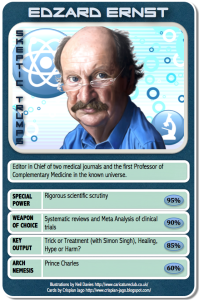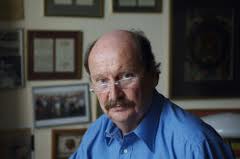By Edzard Ernst
Originally published April 2, 2013
 Reflexology is one of the most popular of all alternative therapies. Anyone who has ever had a session knows why: it is a strangely pleasant and oddly agreeable experience. Reflexologists massage your feet which can be mildly painful but usually is quite relaxing. They look for and subsequently focus on areas of tenderness believing they correspond to specific organs or whole organ systems. Even though few reflexologists would admit to it, they tend to make vague and unreliable diagnoses: if they feel something unusual at a certain point of the sole of your foot, they assume that a certain inner organ is in trouble. Reflexologists even have maps where the sole of a foot is depicted showing which area corresponds to which organ.
Reflexology is one of the most popular of all alternative therapies. Anyone who has ever had a session knows why: it is a strangely pleasant and oddly agreeable experience. Reflexologists massage your feet which can be mildly painful but usually is quite relaxing. They look for and subsequently focus on areas of tenderness believing they correspond to specific organs or whole organ systems. Even though few reflexologists would admit to it, they tend to make vague and unreliable diagnoses: if they feel something unusual at a certain point of the sole of your foot, they assume that a certain inner organ is in trouble. Reflexologists even have maps where the sole of a foot is depicted showing which area corresponds to which organ.
The treatment might be enjoyable but the assumptions that underpin it are nonsensical for at least two reasons: firstly, there are no nerve or other connections between a specific area on the sole of a foot and a certain organ. Secondly, the maps which reflexologists employ differ and fail to agree which area corresponds to which organ. Thus there are inconsistencies within the realm of reflexology and there are inconsistencies in relation to the known facts regarding physiology, anatomy etc.
Proponents of reflexology are quite undisturbed by these problems and seem to believe that not their assumptions but science must be wrong. After all, reflexology does work! That is to say that patients perceive benefit from it, pay out of their own pocket for the experience and tend to come back for more.
Several years ago, we asked 8 UK professional organisations of reflexology which conditions they thought could be treated effectively with reflexology. We gave them a list of 25 conditions to chose from, many of which were serious, e.g. cancer and AIDS. Collectively, the organisations felt that 22 of these illnesses would respond to reflexology.
But this is opinion, not evidence! What do the trial data tell us? Is reflexology more than a placebo?
As with many other areas of alternative medicine, controlled clinical trials are scarce; but this is not to say that none at all are available. Our own trial of reflexology for menopausal symptoms failed to show that this therapy has any effects beyond placebo. More recently, we published a systematic review to evaluate all of the 23 studies that had been published at that stage. They related to a wide range of medical conditions and their methodological quality was often poor. Nine high quality randomised clinical trials (RCTs) generated negative findings. Eight RCTs suggested that reflexology is effective for the following conditions: diabetes, premenstrual syndrome, cancer patients, multiple sclerosis, symptomatic idiopathic detrusor over-activity and dementia. These studies, however, were wide open to bias. Therefore, our conclusions had to be cautious: the best clinical evidence does not demonstrate convincingly reflexology to be an effective treatment for any medical condition.
For you and me, this simply means that there is currently no good evidence to suggest that reflexology works. But the story does not end here. There will be more studies and enthusiasts are most likely to concede that our conclusions were incorrect. In fact, a further trial has just become available.
This new single-blind, randomized and placebo controlled study included 20 moderately to severely affected multiple sclerosis patients. Each participant received for 8 weeks, 1 hour per week of either reflexology or sham reflexology. The primary outcome measure was the Multiple Sclerosis Impact Scale at baseline, 8 weeks and 16 weeks. The results revealed improvements in both groups but no statistically significant differences between the two groups at either 8 or 16 weeks. The conclusions of the investigators were clear: The results do not support the use of reflexology for symptom relief in a more disabled multiple sclerosis population and are strongly suggestive of a placebo response.
There is, of course, nothing wrong with a relaxing foot-massage; it is agreeable, no doubt, and if someone wants to pay for the luxury, why not? By contrast, there is a lot wrong with reflexology, I think. A foot-massage is not administered under the pretence of generating any specific therapeutic effects. Reflexologists, however, claim they can exert highly specific effects on inner organs, influence the natural history of a wide range of diseases, and provide reliable diagnoses. They thus mislead their clients. This is not just wrong, it also has the potential to do serious harm. I believe it is time to end this nonsense.
_________________________________________________________________________________________
Edzard Ernst MD, PhD, FMedSci, FSB, FRCP, FRCPEd
Emeritus Professor, Exeter University
 Dr. Ernst qualified as a physician in Germany in 1978 where he also completed his MD and PhD theses. He received hands-on training in acupuncture, autogenic training, herbalism, homoeopathy, massage therapy and spinal manipulation.
Dr. Ernst qualified as a physician in Germany in 1978 where he also completed his MD and PhD theses. He received hands-on training in acupuncture, autogenic training, herbalism, homoeopathy, massage therapy and spinal manipulation.
Later, he became Professor in Physical Medicine and Rehabilitation (PMR) at Hannover Medical School and Head of the PMR Department at the University of Vienna. In 1993, he moved to the UK and became Chair in Complementary Medicine at the University of Exeter. He is founder/Editor-in-Chief of two medical journals (Perfusion and Focus on Alternative and Complementary Therapies).
He has published 48 books and more than 1000 articles in the peer-reviewed medical literature. His work has been awarded with 14 scientific prizes. In 1999, he took British nationality.
His research focussed on the critical evaluation of all aspects of alternative medicine. Unlike most of his colleagues, he does not aim to promote a particular therapy. His goal is to provide objective evidence and reliable information. It is fair to say that this ambition did not endear him to many quasi-religious believers in alternative medicine.
Healthy Skepticism is republishing selections from Dr. Ernst’s blog with permission. Please visit his website at http://edzardernst.com
